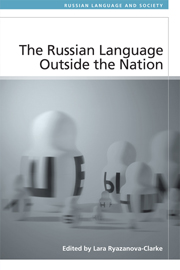Book contents
- Frontmatter
- Contents
- Notes on Contributors
- Cyrillic Transliteration System Adopted in the Book
- Introduction: The Russian Language, Challenged by Globalisation
- PART I Russian and Its Legal Status
- PART II Linguistic Perceptions and Symbolic Values
- PART III Russian-Speaking Communities and Identity Negotiations
- PART IV Language Contact and the Globalisation of Russian
- PART V Globalisation of Russian as Soft Power
- 10 Russian with an Accent: Globalisation and the Post-Soviet Imaginary
- Index
10 - Russian with an Accent: Globalisation and the Post-Soviet Imaginary
from PART V - Globalisation of Russian as Soft Power
Published online by Cambridge University Press: 05 September 2014
- Frontmatter
- Contents
- Notes on Contributors
- Cyrillic Transliteration System Adopted in the Book
- Introduction: The Russian Language, Challenged by Globalisation
- PART I Russian and Its Legal Status
- PART II Linguistic Perceptions and Symbolic Values
- PART III Russian-Speaking Communities and Identity Negotiations
- PART IV Language Contact and the Globalisation of Russian
- PART V Globalisation of Russian as Soft Power
- 10 Russian with an Accent: Globalisation and the Post-Soviet Imaginary
- Index
Summary
INTRODUCTION
Asserting itself as a confident global player, Russia issued in 2009 a new doctrine of national security for the period until 2020. The doctrine included language among the listed instruments of national security (Strategiia Bezopasnosti 2009). This highlighted a developing trend by which the Russian language is increasingly used in the promotion of Russian national interests abroad, as a soft power tool packaged for global consumption. The notion of soft power is widely interpreted as an ability of a country to ‘co-opt rather than coerce’ and to ‘shape the preferences of others’ (Nye and Jisi 2009: 18; Nye 2004; 2011). In order to serve these purposes, agents of soft power attribute to the Russian language specific symbolic values, salient among which is the ability to structure an integrative ideology aimed at fostering an enduring sense of identification with Russia. In accordance with this trend and starting approximately from the middle of the first decade of the millennium, a number of state sponsored organisations have been launched with an objective vigorously to promote Russian language and cultural products abroad and, consequently, to establish Russia as a centre of global cultural flow. Perhaps the best-known initiative was the establishment in 2007 by the president's decree of the Russkii Mir Foundation, aimed at the popularisation of the Russian language across the world.
- Type
- Chapter
- Information
- The Russian Language Outside the Nation , pp. 249 - 281Publisher: Edinburgh University PressPrint publication year: 2014

